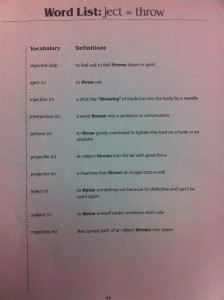T minus 2 days until field day!
I realized I haven’t spoken about this fun-filled day at all here. This Friday, the 8th, we will be having our yearly field day. We will spend the afternoon outside doing a wide range of physical activities and games. It will be great!
As a class we decided to celebrate our last jewel by watching a movie and having snacks the morning before we have field day. I sent home a permission slip today asking permission to watch a movie that morning and to share some snacks. If you could sign it and get it back, I would really appreciate it.
We started our day talking more about decimal multiplication using the standard algorithm. Tonight students have yet more practice with this. I beg of you, please do not teach them the tips and tricks you were taught when you were younger. The purpose of this exercise is not for them to learn a ‘trick’ to find the answer.
The purpose of this practice is for them to realize that in order to multiply something like 3.4 and 2.25, they are going to multiply (3 + .4) x (2 + .2 + .05), and how we distribute the multiplication across. It is also for them to realize that when we multiply .4 and .05, as our first step in the standard algorithm, we are multiplying 4 tenths and 5 hundredths, the answer to which will be 20 thousandths. This is not 4 times 5. The answer is not 20.
Decimal Multiplication Practice
For this reason they should do each problem just as we have done the first two. Not only does this ensure they think about what they are actually multiplying within the problem, it shows them exactly where they are in regards to place value, and where decimal points should go.
We next spent some time on brainpop looking at forces, gravity, and more of Newton’s laws. I think we are finally overcoming some of our students’ misconceptions about how force, mass, and acceleration are related.
When I first asked students the other day what would happen if I made our lego car heavier and sent it down the ramp, many thought that it would go farther than when it was lighter. It took many demonstrations to convince them that as we add mass, it takes more and more force to move something (it’s inertia increases).
Today when I asked the same question of a group of students, we only had 2 that were still mistakenly thinking that ‘heavier = moves faster’. This is probably due to the idea that something that is heavier falls faster (which is also incorrect). We’ll keep hitting on this one throughout the week.
Next we started typing up some of our poetry. We talked about how we can do all sorts of things with poetry on our pages. We can decide how we want them to look:
Straight
Rigid
No Frills
Flowery
Fluid
Free
Or maybe something else!
Finally, we talked a bit about Invictus. Some students had no connections to make between their own lives and the poem. For this reason I chose to share some connections I had (And that perhaps you have had, if you’ve ever seen the movie by the same name).
We watched a short video on Apartheid in South Africa. And then looked at a time-line of events that occurred in South Africa during this period.
This was completely new information for many students. We have had discussions about racism and civil rights in the U.S., but not about these problems in other countries. It was a very interesting conversation, and I asked students to reflect upon why they think Mr. Potter connects the poem to this portion of South Africa’s history, and if they see any connections themselves.
This is some pretty heavy stuff, and if you would like to have a conversation with your student about this, and ask them what they think, I believe it would be a great discussion.
Tonight students should answer this:
5. Why do you think Mr. Potter draws a connection between the poem Invictus, and apartheid in South Africa? Do you see any connections?
They should also finish their sentences for ject words!
so, tl;dr
Set of decimal multiplication problems, done as we have done in class!
Decimal Multiplication Practice
Answer this question about the Invictus poem:
Why do you think Mr. Potter draws a connection between the poem Invictus, and apartheid in South Africa? Do you see any connections?
Finish a sentence for each of our -ject words
As always, read for 35 minutes please!
Have a good one,
-Mr. Potter
